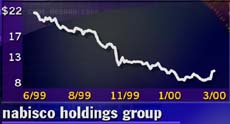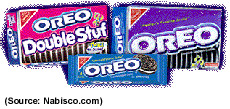|
Will Icahn gobble Nabisco?
|
 |
March 20, 2000: 3:43 p.m. ET
Both sides mum on billionaire's latest bid to gain control of the company's board
By Staff Writer Tom Johnson
|
NEW YORK (CNNfn) - When billionaire corporate raider Carl Icahn made his seemingly perennial bid to take over Nabisco Group Holdings' board last week, he set the stage for the kind of protracted power struggle that traders typically feast upon.
Only this time, Wall Street hardly batted an eye at Icahn's proposal. In fact, the only noticeable response came in the form of a poison pill defense enacted by the company's board, further reducing Icahn's leverage.
Now, with Nabisco's annual meeting in Wilmington, Del., just seven weeks away, analysts said it appears shareholders and the company's management are equally flummoxed as to how the nation's cookie and cracker king can regain some of its bite on Wall Street.
"Clearly there is a situation here where there is a serious discount to Nabisco's earnings," said Nomi Ghez, an analyst with Goldman Sachs. "I can see why someone would want to come in and take advantage of the situation. But [as] you can see from the stock price reaction, no one is taking [Icahn] too seriously."
Greeting Icahn with a yawn
Indeed, since Icahn proposed replacing the company's current board with his own nine-member slate last Monday -- typically a catalyst for a surge in the company's stock price -- Nabisco (NGH: Research, Estimates) shares managed to inch forward only in fits and starts, although by week's end they had advanced 1-3/8 to 10, or nearly 16 percent.
That's still a far cry from last June, when the stock traded as high as 22 shortly after the maker of Oreos, Newtons and Ritz spun off its tobacco holdings, hoping to shield the food operations from the plethora of state and federal lawsuits filed against the industry.
 That strategy never really paid off, however. Nabisco's stock eventually succumbed to the pressure of a depressed food sector, and was further weighed down by lingering concerns over the company's potential exposure to the tobacco lawsuits. That strategy never really paid off, however. Nabisco's stock eventually succumbed to the pressure of a depressed food sector, and was further weighed down by lingering concerns over the company's potential exposure to the tobacco lawsuits.
Despite the company's performance on Wall Street and grumbling from some shareholders like Icahn, the company's management team -- led by Steven Goldstone, the company's chairman since 1996, and President and CEO James Kilts -- has managed to retain strong backing on Wall Street.
"The Nabisco management team is doing everything in their power to improve shareholder value," said John O'Neil, an analyst with PaineWebber who follows Nabisco Holdings, Nabisco's lone subsidiary. "The food sector has just been drastically out of favor."
The fundamentals of this company are probably among the best in the industry right now," agreed Ghez. "Anything Icahn can do to increase the value, God bless him. I'm just not seeing what he's going to do."
Icahn mum on plans
For his part, Icahn has been decidedly quiet on his exact plans for Nabisco's board meeting. He declined to comment for this article, but he historically has used the takeover proposal to make a bundle of cash.
He threatened similar bids in 1995, 1996 and 1999, each time withdrawing his proposal before it came up for an official vote. In each instance, Icahn hoped to force the company's board into spinning off its food division, leaving the RJR tobacco shell to deal with the pending legal liabilities.
But in the end, the company's management decided to spin-off the tobacco unit instead, ridding itself of some -- but not all -- of the financial liability. Icahn was unhappy with the ultimate decision, but walked away with a millions in profit each time as shareholders ran up the stock price in hopes of a takeover.
But sources familiar with Icahn's thinking say he may be more serious about taking his bid to shareholders this time. Through various subsidiaries, he started quietly accumulating shares earlier this year, eventually buying an 8.9 percent stake in the company.
In a filing with the U.S. Securities and Exchange Commission, Icahn proposed a nine-member board that he said "will better enhance stockholders value than the current board of directors," although he declined to indicate how.
Icahn's moves limited?
Analysts said one reason the stock hasn't reacted to Icahn's proposal is an outright takeover of the company within two years of the spin-off of the tobacco business would trigger costly legal and tax liabilities.
Still, there has been some question as to exactly how expensive those provisions would be, and the company's critics wonder if Nabisco wouldn't still be better off given where its stock price has been trading.
 Nabisco has been struggling to reorganize its balance sheet in recent years, cutting roughly 12,500 jobs and closing several factories since 1994 in an attempt to stimulate sales. Nabisco has been struggling to reorganize its balance sheet in recent years, cutting roughly 12,500 jobs and closing several factories since 1994 in an attempt to stimulate sales.
The results have been mildly successful. Profit rebounded last year to $281 million, up from $239 million in 1998, while sales increased 2 percent to $8.27 billion. But shareholders have hardly noticed as Wall Street turned its back on old-line stocks like Nabisco for high-flying tech shares.
Icahn's proposed board almost identically mimics the slate he proposed last year. Included are New York Housing Finance Authority Chairman Jerome Becker, Jack Wasserman, senior partner at the New York law firm of Wasserman Schneider and Babb, and Seymour Fliegel, president of the Center for Educational Innovation in New York, as well as three executives of companies owned by Icahn.
Nabisco taps former food consultant
Nabisco, likewise, declined comment for this article. The company made only a passing reference to Icahn's proposal in its proxy statement filed last week, saying only it had "serious concerns" about the possible bid.
"Obviously the board is looking at this and will take any appropriate actions, but that's just not something we want to comment on right now," said Henry Sandbach, a Nabisco spokesman.
Still, the Parsippany-based company moved swiftly to enact a poison pill defense the day Icahn announced he would propose a competing board. The shareholders rights plan is triggered when a shareholder acquires a 10 percent stake in the company.
The board also added former food industry consultant Nancy Karch to its ranks on Friday. Karch, who was a senior partner with international consulting firm McKinsey & Co., brings a deep background of consumer packaged goods and the retail industry.
What this will all mean come May 9 remains to be seen. All are now waiting for Icahn to make his next move. 
|
|
|
|
|
|
Nabisco
|
Note: Pages will open in a new browser window
External sites are not endorsed by CNNmoney
|
|
|
|
 |

|

